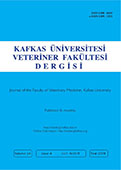
This journal is licensed under a Creative Commons Attribution-NonCommercial 4.0 International License
Kafkas Üniversitesi Veteriner Fakültesi Dergisi
2018 , Vol 24 , Issue 4
Effect of Grape Seed Extract on the Oxidative and Proliferative Status of Porcine Intestinal Epithelial Cells
1Key Laboratory of Agro-ecological Processes in Subtropical Region, Hunan Research Center of Livestock & Poultry, Sciences, South-Central Experimental Station of Animal Nutrition and Feed Science in Ministry of Agriculture, Institute of Subtropical Agriculture, The Chinese Academy of Sciences, Changsha, Hunan 410125, P. R. CHINA2Key Laboratory for Bio-feed and Molecular Nutrition, Southwest University, Chongqing 400715, P. R. CHINA
3National Research Center of Engineering & Technology for Utilization of Botanical Functional Ingredients, Hunan Agricultural University, Changsha, Hunan 410128, P. R. CHINA DOI : 10.9775/kvfd.2018.19457 The aim of this study was to investigate the oxidative and proliferative effects of grape seed extract (GSE). Piglet intestinal epithelial cells (IPEC1) were selected as an unstressed cell model, or they were exposed to 400 μM H2O2 to establish a H2O2-stimulated cell model. The glutathione (GSH) and total antioxidant capacity in response to GSE addition were tested in the unstressed and H2O2-stimulated cell models. The relative mRNA levels of antioxidant or antioxidant enzymes and apoptosis-related genes were measured by Real-Time RT-PCR. In the unstressed status, the cell survival ratio and GSH increased with the addition of GSE at 1 and 10 μg/mL but diminished at 60 μg GSE/mL. The addition of 1 μg/mL GSE upregulated the mRNA expression levels of B-Cell Lymphoma protein-2 (Bcl-2), cysteine aspartases-3 (Caspase-3), cysteine aspartases-8 (Caspase-8) and glutathione peroxidase-1(GPx-1), while it downregulated that of Bcl2-associated X protein (Bax), copper-zinc superoxide dismutase, glutathione S-transferase (GST), thioredoxin, thioltransferase and thioredoxin reductase. As GSE reached 60 μg/mL, the tumor protein p53 (p53) and caspase-8 gene expressions were upregulated. In stressed status, 1 and 10 μg GSE/mL promoted the increase of GSH. H2O2- induced increases in Bax, p53, and Caspase-3 mRNA expressions were attenuated by the subsequent addition of 1 μg GSE/mL and promoted the gene expression of tumor necrosis factor-α, GPx-1 and thioltransferase (Ttas). Treatment with 60 μg GSE/ml resulted in a significant reduction in Bax, p53, manganese superoxide dismutase and GST mRNA expressions. These results indicate that GSE exhibits antioxidative and proliferative functions on unstressed IPEC1 cells at low and medium levels and oxidative and antiproliferative functions at high levels. Keywords : Grape seed extract, Antioxidation, Proliferation, Intestinal epithelial cells










